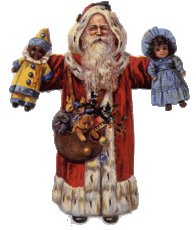|
|
 |
|
|
|
|
 |
|
|
Christmas Gifts
The tradition of giving gifts has many roots; however, the most widely accepted one evolved from the story of St. Nicholas, a bishop, who was born in Turkey. The story goes that he had heard of a family with three daughters all over marriageable age who were unable to wed as they had no dowry. St. Nicholas had to give up all of his worldly possessions to become a bishop so he took three bags of gold coins and dropped them down the chimney. The coins landed in the girls stockings which had been hung to dry on the fireplace. St. Nicholas was caught in the act by their father whom St. Nicholas begged to keep his secret; however, barely two days later the entire village learned of the gifts.
Christmas Pudding
The tradition surrounding the Christmas pudding originated in the 14th century and actually was a porridge made by boiling beef
and mutton which was combined with raisins, currants, prunes, wines and spices. It is made
in large copper kettles and prepared several weeks before Christmas. The making of the
pudding is attended by the entire household and each family member takes their turn at
stirring the thick, steaming stew and makes a wish. By the 1600's the addition of eggs and breadcrumbs, ale and spirits, improved its taste significantly and it became the
traditional end of Christmas dinner. It was banned during the Protestant Reformation, and
re-established as part of the traditional Christmas feast by George the First. A silver
coin is usually placed in the pudding along with a ring, button and thimble. the finders
of these objects respectively, would be given the gift of wealth, be married within the
year or be doomed to bachelor or spinsterhood.
breadcrumbs, ale and spirits, improved its taste significantly and it became the
traditional end of Christmas dinner. It was banned during the Protestant Reformation, and
re-established as part of the traditional Christmas feast by George the First. A silver
coin is usually placed in the pudding along with a ring, button and thimble. the finders
of these objects respectively, would be given the gift of wealth, be married within the
year or be doomed to bachelor or spinsterhood.
Christmas Tree
This tradition is believed to have originated in Germany in the early 700s. But the history of the modern Christmas tree as we know it goes back to 16th century Germany. It didn't become popular in England until 1841 when Prince Albert imported a fir tree from his native Germany and set it up for his wife, Queen Victoria and their children. It was from this time on that the candle-lit, highly decorated Christmas tree became an integral part of the Victorian Christmas celebration.
Father Christmas
 In the earlier part of the century, there was the revival of a Viking tradition of a jovial, winter figure associated with their winter festival and referred to as the "Spirit of Christmas". By inviting him in through the "front door" to join in the holiday feasting, it was believed that winter would be kind to them. When the benevolent, gift-giving character reappeared in England a few years ago, he was immediately bestowed the title of the "Spirit of Christmas" the symbol of jollity and gift-giving but has since been renamed "Father Christmas". His visits are now supposed to be a "surprise" and he now arrives during the night down the chimney.
In the earlier part of the century, there was the revival of a Viking tradition of a jovial, winter figure associated with their winter festival and referred to as the "Spirit of Christmas". By inviting him in through the "front door" to join in the holiday feasting, it was believed that winter would be kind to them. When the benevolent, gift-giving character reappeared in England a few years ago, he was immediately bestowed the title of the "Spirit of Christmas" the symbol of jollity and gift-giving but has since been renamed "Father Christmas". His visits are now supposed to be a "surprise" and he now arrives during the night down the chimney.
First Footing
In some countries, first-footing takes place at the New Year, but in most of England, it occurs on Christmas Day. The first-footer is the first person to enter the house and is said to let in Christmas. In some areas, he is professionally hired to be sure that all is done properly. He carries an evergreen twig, comes in through the front door, passes through the house and exits through the rear. He may be given salt or bread or some other small gift as a symbol of hospitality. He has dark hair, not red and is always a male.
Holly
 Holly was considered to be
magical because of its shiny leaves and its ability to bear fruit during the winter. It
was believed that in a syrup it would stop coughs and that when hung over one's bed, would
induce sweet dreams. It was also popular in the celebration of the Roman Saturnalia and it
was the Romans who brought it to England.
Holly was considered to be
magical because of its shiny leaves and its ability to bear fruit during the winter. It
was believed that in a syrup it would stop coughs and that when hung over one's bed, would
induce sweet dreams. It was also popular in the celebration of the Roman Saturnalia and it
was the Romans who brought it to England.